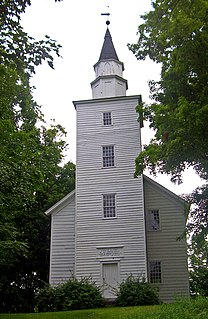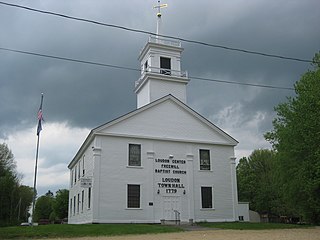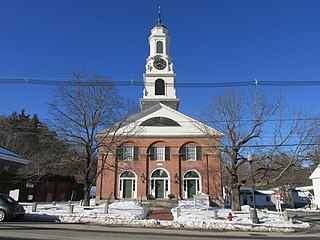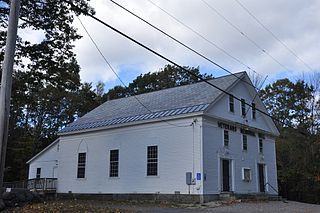
The Primitive Baptist Church of Brookfield, also known as the Old School Baptist Meeting House, is located along US 6 in Slate Hill, New York, United States, a hamlet of the Town of Wawayanda in Orange County. It was built in 1792, when the settlement was known as Brookfield. It is one of the oldest extant church buildings in the county, and one of the earliest buildings in the settlement that became Slate Hill.

The Round Church, also known as the Old Round Church, is a historic church on Round Church Road in Richmond, Vermont. Built in 1812–1813, it is a rare, well-preserved example of a sixteen-sided meeting house. It was built to serve as the meeting place for the town as well as five Protestant congregations. Today it is maintained by the Richmond Historical Society and is open to the public during the summer and early fall, It is also available for weddings and other events. It was declared a National Historic Landmark in 1996 for the rarity of its form and its exceptional state of preservation.

The Rockingham Meeting House, also known as Old North Meeting House and First Church in Rockingham, is a historic civic and religious building on Meeting House Road in Rockingham, Vermont, United States. The Meeting House was built between 1787 and 1801 and was originally used for both Congregational church meetings as well as civic and governmental meetings. Church services ceased in 1839 but town meetings continued to be held in it until 1869. It was restored in 1906 and has been preserved.

The Richmond Community Church is a historic church building on Fitzwilliam Road in Richmond, New Hampshire, United States. Built in 1838, it is a distinctive regionally early example of Greek Revival church architecture executed in brick. The church was listed on the National Register of Historic Places in 1983. It is now owned by a Methodist congregation.

The Second Rindge Meetinghouse, Horsesheds and Cemetery is a historic meeting house and cemetery on Old US 202 and Rindge Common in Rindge, New Hampshire. Built in 1796, it is relatively distinctive in New England as one of few such meeting houses where both civic and religious functions are still accommodated, housing both the town offices and a church congregation. The town's first cemetery, established in 1764, lies to the north of the meetinghouse. It is the resting place of many of Rindge's early settlers, and of its American Revolutionary War veterans. Behind the meetinghouse stand a row of horse sheds, the only one of the two rows of them which originally served the meetinghouse. The property was listed on the National Register of Historic Places in 1979.

The First Free Will Baptist Church in Meredith is a historic church building at 61 Winona Road in Meredith, New Hampshire, United States. Built about 1802 and remodeled in 1848, it is a good example of a mid-19th century vernacular Greek Revival rural church. It is now a museum called the Pottle Meeting House, managed by the local historical society. The building was listed on the National Register of Historic Places in 1986.

The Early Settlers Meeting House is a historic church building at the junction of Granite and Foggs Ridge roads at Leighton Corners in the town of Ossipee, New Hampshire, United States. Built in the 1810s for a Free Will Baptist congregation and remodeled in 1856, it is a well-preserved example of a vernacular mid-19th century church. Now owned by the Ossipee Historical Society, the building was listed on the National Register of Historic Places in 1995.

The First Free Will Baptist Church is a historic church on Granite Road in Ossipee, New Hampshire. The wood-frame white clapboarded building was built in 1856-57, and is a fine little-altered local example of a vernacular Greek Revival country church. The building was listed on the National Register of Historic Places in 1984.

The Union Church is a historic church on South Main Street in South Wolfeboro, New Hampshire. Built in 1845 for the use of several small religious congregations, it is a well-preserved example of mid-19th century vernacular Greek Revival architecture. The building was listed on the National Register of Historic Places in 1982.

The Wolfeboro Centre Community Church is a historic church on New Hampshire Route 109 in Wolfeboro Center, New Hampshire. Built in 1841 for two separate congregations, it is a well-preserved example of a rural mid-19th century church. The building was listed on the National Register of Historic Places in 1984.

The Center Meetinghouse is a historic meetinghouse on NH 103 in Newbury, New Hampshire. The Federal-style church building was built c. 1832, a relatively late date for the style. It replaced a 1797 meetinghouse that had been located about a mile away. It is further believed to be distinctive in New Hampshire as the only Federal period church in which the pulpit is located at the rear of the auditorium. Originally built to be used by multiple religious denominations, it is now operated by a local nonprofit organization as a community center. It was listed on the National Register of Historic Places in 1979.
The First Congregational Church of Boscawen is a historic church at 12 High Street in Boscawen, New Hampshire. Built in 1799, the wood frame church was significantly altered in 1839, when it acquired its present Greek Revival character. It is one of the few surviving meeting houses in New Hampshire that continues to combine religious and municipal functions; it basement space is used for town meetings and elections. The building was listed on the National Register of Historic Places in 1982.
The Danville Meetinghouse is a historic colonial meeting house on North Main Street in Danville, New Hampshire. Construction on the building began in 1755 and was finished in 1760 when Danville petitioned to form a town of its own, separate from Kingston. It is the oldest meetinghouse of original construction and least-altered in New Hampshire, with a remarkably well preserved interior. The building, now maintained by a local nonprofit organization, was added to the National Register of Historic Places in 1982.
The Sandown Old Meetinghouse is a historic meeting house on Fremont Road in Sandown, New Hampshire. Built in 1773, this two-story timber-frame structure is a virtually unaltered late-Colonial civic and religious structure. It is believed to be unique in the state for its level of preservation, both internal and external. The building, now maintained by a nonprofit organization, was listed on the National Register of Historic Places in 1978, and the New Hampshire State Register of Historic Places in 2011.
The Canaan Chapel is a historic chapel on Canaan Road in Barrington, New Hampshire. Built in 1881, it is a typical example of a rural Free Will Baptist church of the mid-19th century, exhibiting modest elements of Greek Revival design despite a late construction date for that style. The building was listed on the National Register of Historic Places in 1982.
The Allenstown Meeting House is a historic meeting house on Deerfield Road in Allenstown, New Hampshire. Built in 1815, it is New Hampshire's only surviving Federal-style single-story meeting house to serve both religious and civic functions. It was listed on the National Register of Historic Places in December 2004, and the New Hampshire State Register of Historic Places in July 2004. It is presently owned and maintained by the town.

Loudon Town Hall is a historic New England meetinghouse at 433 Clough Hill Road in Loudon, New Hampshire. Built in 1779 and extensively restyled in 1847, this Greek Revival structure was used for many years for both religious and civic purposes; it now serves principally as a church, housing a Free Will Baptist congregation. The building was listed on the National Register of Historic Places in 1990; it is one of the oldest civic buildings in Merrimack County.

The Peterborough Unitarian Church, also once known as the First Church in Peterborough, is a historic American church at Main and Summer streets in Peterborough, New Hampshire. Built in 1825-26 for a congregation founded in 1752, it is one of the state's finest examples of a Federal period church, drawing inspiration from the publications of Asher Benjamin. The building was listed on the National Register of Historic Places in 1973.

Jones Hall, also known as The Meetinghouse at Marlow Hill or The Christian Church, is a historic church and municipal building on Church Street in Marlow, New Hampshire. Built between 1792 and 1800, it is a rare 18th-century meeting house in New Hampshire, although it has been altered somewhat and moved from its original location; it was said to originally be a near duplicate of the Rockingham Meeting House in Vermont. Construction of the timber frame building was repeatedly delayed due to a shortage of funding. It first served as a combined religious and civic meeting house, with ownership residing with the society of pew owners.

The Veterans' Memorial Hall, formerly the First Universalist Society Meeting House, is a historic community building on New Hampshire Route 32 in Richmond, New Hampshire. The 1-1/2 story clapboarded wood-frame building was built in 1837 by members of the local Universalist congregation. Richmond was the birthplace of Hosea Ballou, a theologian influential in the development of Universalism; he left the town before this building was built. As originally built, the meeting house had a small tower and belfry, which were removed in 1892 when the building was acquired by the local Grange. The building has seen only modest external alterations since then; the interior has had most of its religious trappings removed, but is also otherwise little altered.


















